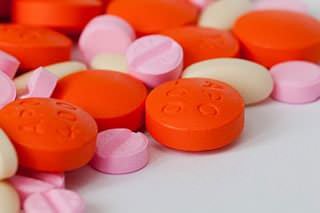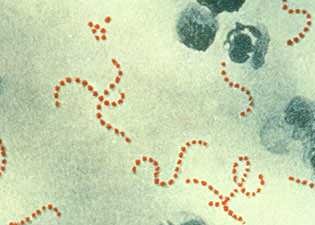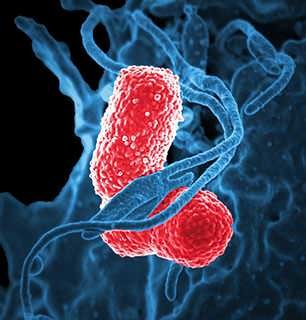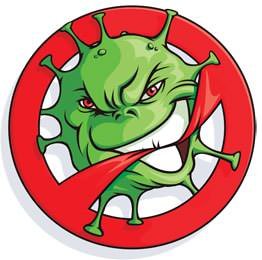We're Feeding Antibiotic Resistance By 'Taking All' Our Prescribed Antibiotics
Most of us have had a form of bacterial infection (or invasion) at some point in our lives where the doctor treating us prescribes us some antibiotics. We are all told to "finish", "complete" or "take all" of the prescribed antibiotics. Many of them stress that you need to take the full course or else risk not killing all of the disease-causing bacteria, allowing it to mutate and form a resistance to the treatment.
Although this may have appeared as sound judgment, it turns out this may never have been the case. Have we been told falsities about how to use antibiotics to overcome an infection in our body? Most likely, as new research is saying there is no evidence that this old theory about not finishing a course of antibiotics leads to antibiotic resistance. Finishing antibiotic treatments is likely producing greater antibiotic resistance.
The idea of antibiotics needing to be taken in full as prescribed or else it could create antibiotic resistance comes from the 1940s when antibiotics first started. In running out of penicillin for a patient, a clinic noticed the patient succumb to the infection again despite having improved while being treated. The idea of prolonging therapy to avoid treatment failure was adopted, but there was no evidence of antibiotics resistance.
They posited the idea of someone who had a streptococcal throat infection, not completing their antibiotics treatment, developing resistance, and then infecting someone like their wife who would get infected with the drug resistant form and die. Even though this ideas was accepted, after all these years Streptococcus pyogenes has never developed a resistance to penicillin.
This whole idea of not taking your full prescription antibiotics leading to antibiotic resistance, is not evidence-based and it turns out to be incorrect. The United Nations World Health Organization, and the US FDA, are still advising people to take the full prescription given by their doctor. They still think that if you don't take all your antibiotics, then you're not killing all of the disease causing bacteria, and allowing it to mutate into a resistance.
This new research dispels this fable by establishing links between treatment generation, effectiveness and drug resistance, finding no evidence that a shorter treatment is inferior or that it triggers antibiotic resistance. Whenever we take any antibiotic, sensitive microorganisms on our skin or in our gut are replaced by resistant species and strains that are ready to cause infection in the future. The longer we take antibiotics, the more exposure we have and the more real estate those resistant species will take up in our bodies.
The study urges policy makers, doctors and educators to stop advocating for the "full course treatment" of antibiotics. Peter Openshawm -- president of the British Society for Immunology -- agrees, saying that antibiotics might be better used to only reduce the bacterial burden to a level where the natural immune system is able to cope with the infection and fight it off. Not that there isn't a case for extended treatment, such as for slow-growing or dormant bacteria.
After all these years, the antibiotic resistance that is spreading in society and causing big problems of untreatable infections in hospitals might be traced to the spreading of this false idea by doctors and policymakers early on. Instead of making sure harmful bacteria were killed, taking all of the prescribed antibiotics was making bacteria more resistant to antibiotics, and less effective in the future. If we would have been using antibiotics to lighten the load on our natural immune system, maybe the antibiotics resistance issue wouldn't be so big.
Have your local hospitals had issues with antibacterial resistance?
Does taking antibiotics bother you?
Do you avoid taking antibiotics?
Do you take antibiotics regularly?
I avoid them as much as possible. It's been years since I've taken an antibiotic. I haven't had a cold in years either. Montreal hospitals have had issues with the spread of the c. difficile bacteria in the past. I hope we can overcome the bacterial resistant era we are in.
Thank you for your time and attention. Peace.
References:
http://www.telegraph.co.uk/science/2017/07/26/gps-must-stop-telling-patients-finish-course-antibiotics-say/
https://www.theguardian.com/society/2017/jul/26/rule-patients-must-finish-antibiotics-course-wrong-study-says
https://medicalxpress.com/news/2017-07-message-antibiotics-experts.html
http://www.bbc.com/news/health-40731465
http://www.bmj.com/content/358/bmj.j3418
If you appreciate and value the content, please consider:
Upvoting  , Sharing
, Sharing  or Reblogging
or Reblogging  below.
below.





Antibiotics and Food
It's vital not to take any more antibiotic than you really need to. There are cases, where they are really the only viable treatment, that they needs to be used and then it's a specific strand that is best. They work best on specific cases and "taking them 'all" are just insane to say the least.
You may get antibiotics even if you are never at the doctor!
But avoiding taking antibiotics from doctors prescribing them are not going to help you away from them, not even if you are never at the doctors place.
The reason for this is because cattle, chicken and any other animal breeder gives their animals antibiotics to prevent outbreaks. They are living in dirty and some times very stressful upbringings, and the breeders reson that this will prevent sick animals. They may very well do, but it's on to cost of your and everyone else's health
Reportage on this topic from Norway
To anyone that have access to a VPN or domestic access to Norwegian NRK I can highly recommend their program on When Antibiotics Stop Working
Say no to Antibiotics; Both from "General Sickness Prevention" Doctors and from Animal Farmers!
If Antibiotics is the ONLY option left, of course should it be used, but it may have no effect because it has been used in such a sloppy manner for so many years
Thanks for the information :)
Very interesting post.
Personally I avoid antibiotics at all costs as I believe they can greatly reduce health in the long run.
Many people are all too eager to take a course of antibiotics for minor infections which the body could more than likely clear by itself given a little time. Also I find many doctors prescribe them too freely even with this issue of antibiotic resistance.
I constantly hear of parents rushing to the doctor with their children, practically demanding a course of antibiotics for what is more than likely a viral infection anyway.
Of course there are times when we need to use antibiotics, but I believe they should be restricted more carefully to these occasions only.
Indeed. Antibiotics are all the rage to "cure" anything, at least in people's minds it is, as they emotionally worry about their children and don't understand how it applies.
I like toast 🍞
i prefer not do go to doctor if there is not something bad happens. I took antibiotic many times like 10 years ago, last years no antibiotics , i think you dont need to take them for preventive purpose. btw i like that last picture with green bacteria :) But overall in medicine field - drugs,antibiotics,pills the more u take, the more is your resistance for them, so you will need more and more and so on.
Yup, the more you take the more you need, good point on how that applies to much.
This is unbelievably scary. Recently, my niece was diagnosed with MRSA. My sister (her mom) and I were terrified that it may have mutated and would be untreatable. There's an interesting documentary on Netflix that talks about antibiotics and how researchers cannot develop new antibiotics fast enough to keep up with the mutations. It's called Resistance. (Link to IMDB)
Best wishes for your niece, thanks for the link.
I do agree with the part regarding antibiotics will decrease the whole body's stress from bacteria/ bacterial load, allowing our body to cope with the infections. I do believe in the hypothesis that below certain bacterial load, our body will be able to clear the infection, but once above the threshold level, we will lose the war by ourselves.
However, regarding the "full" course, it is vaguely described, if a doctor prescribe a two days course (which in the past might be 10 days), your post become misleading!! Furthermore there are actually studies talking about sub-lethal dose of antibiotics could stimulate bacterial virulence genes, which makes them more aggressive to human, that likely meant more toxin secreted and more adhesion protein. Increase in virulence is not favorable to the infected host. @mcw had a post briefly described this HERE
Also for S. pyrogenes, not having develop resistance to Beta-Lactam might be the result of its small genomic size, mutations or evolution of resistance genes are always more favorable if you have an extra copy of the existence gene, so that the bacteria doesn't die by losing the only gene when their mutation might lead to a non-functional gene.
I will still recommend people to finish the prescribed dose, after all many of us are not doctors, and failing to take appropriate treatments, and if we miss the golden treatment window, it is always us the sufferer
Fortunately, after my 14th year on Earth I quit taking medication unless it was very necessary to do so. Also I very rarely (socially) drink. Now Im 37, and I've been quite healthy although I'm not careful what I eat and although I smoke quite a bit.
A good tip for health is alkaline diet. I can eat whatever junk I want as long as I also assist my body to keep toxicity levels low. I also take multivitamin supplements once in a while. :)
Thanks for the feedback, people need to think a bit more about what the length of the course is, hehe. Stopping when you feel it's gone might be better, I forgot to mention that in the post, oops.
I do agree the medical industry might need to do something about the antibiotics resistances as well as optimizing the best dosage for patients in order to prevent losing of the precious antibiotics we have due to resistant bugs~
This is the first time that I have heard about NOT taking the full course of antibiotics to reduce resistance!
Very interesting. . .
I make my own Collodial Silver and use it weekly to gargle with.
Thanks for the info!
Cool, colloidal silver is controversial lol. Do you ingest it?
I used to ingest small amounts, now-a-days I just gargle, leave under my tongue for a minute and spit out.
What is the controversy? Hopefully not about turning blue.
It was put in the eyes of newborns before antibiotics to kill any bacteria that may have been picked up from the birth canal. . .
Hopefully I am doing no harm :)
great article :)
I try to avoid antibiotics as often as possible. In fact, I took my first antibiotics about 1 year ago...
Damn! That's impressive!
I did avoid taking it but I didn't know the other side of the story. Thanks for sharing!
Personally I don't take anything unless I really have to!
I think part of the problem is that doctors sometimes prescribe antibiotics when they don't need to; I know some people that almost demand them for a cold, where they would be ineffective - in this type of case some re-education would go a long way.
I would also be wary on telling people not to take the full course - this should be determined by the GP as surely it would depend on the person and their overall heath? I mean, it could have a much greater effect on vulnerable elderly person than on me, an otherwise healthy 30 year old.
Do you think the age of antibacterial wipes / soap / detergent may also contribute? Back in the day a good old bar of soap and a bit of fairy always did the job!
At the moment I am working on a few academic trials which are looking at alternatives to antibiotics; currently awaiting results from a trial looking at Gentamicin in the treatment of Gonorrhoea (G-TOG) ...
Yeah, people need to listen to doctors sure, but they need to think for themselves and not simply trust what someone else says. People die from blindly trusting those they think are trustworthy and know what they are doing. How many doctors don't know a damn thing about nutrition for solving issues like diabetes? Thanks for the feedback. Good luck in your trials.
Be careful with the things you publish, check first that if they are true, Streptococcus pyogenes resistance problems are referred to macrolides resistance. You just need to go to a microbiology book to know that drug resistance can be caused by not finishing the dose of antibiotics
Indeed, if the bacteria isn't killed off, it will develop a resistance for later repeated attempts using the same method. Thanks for the feedback.